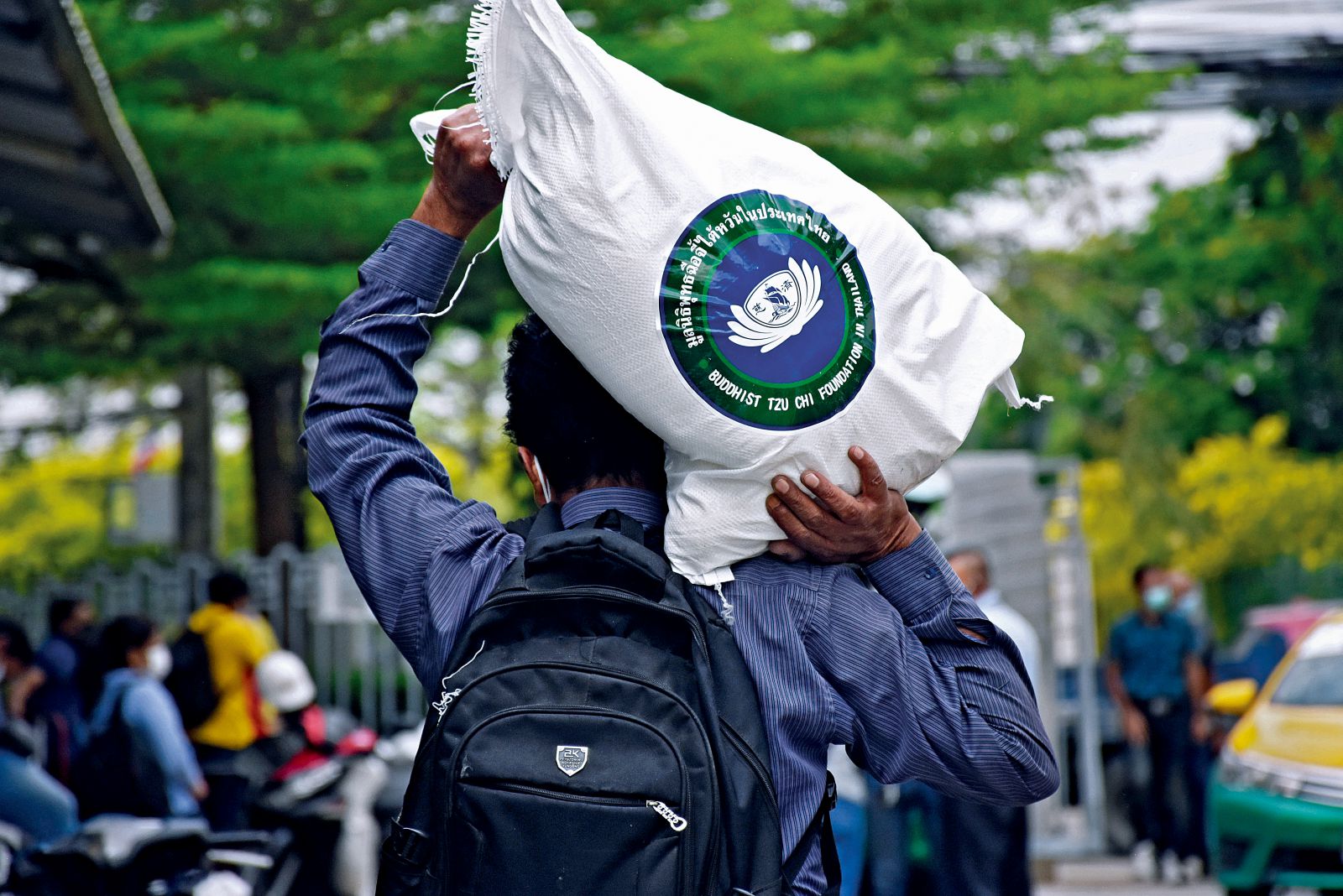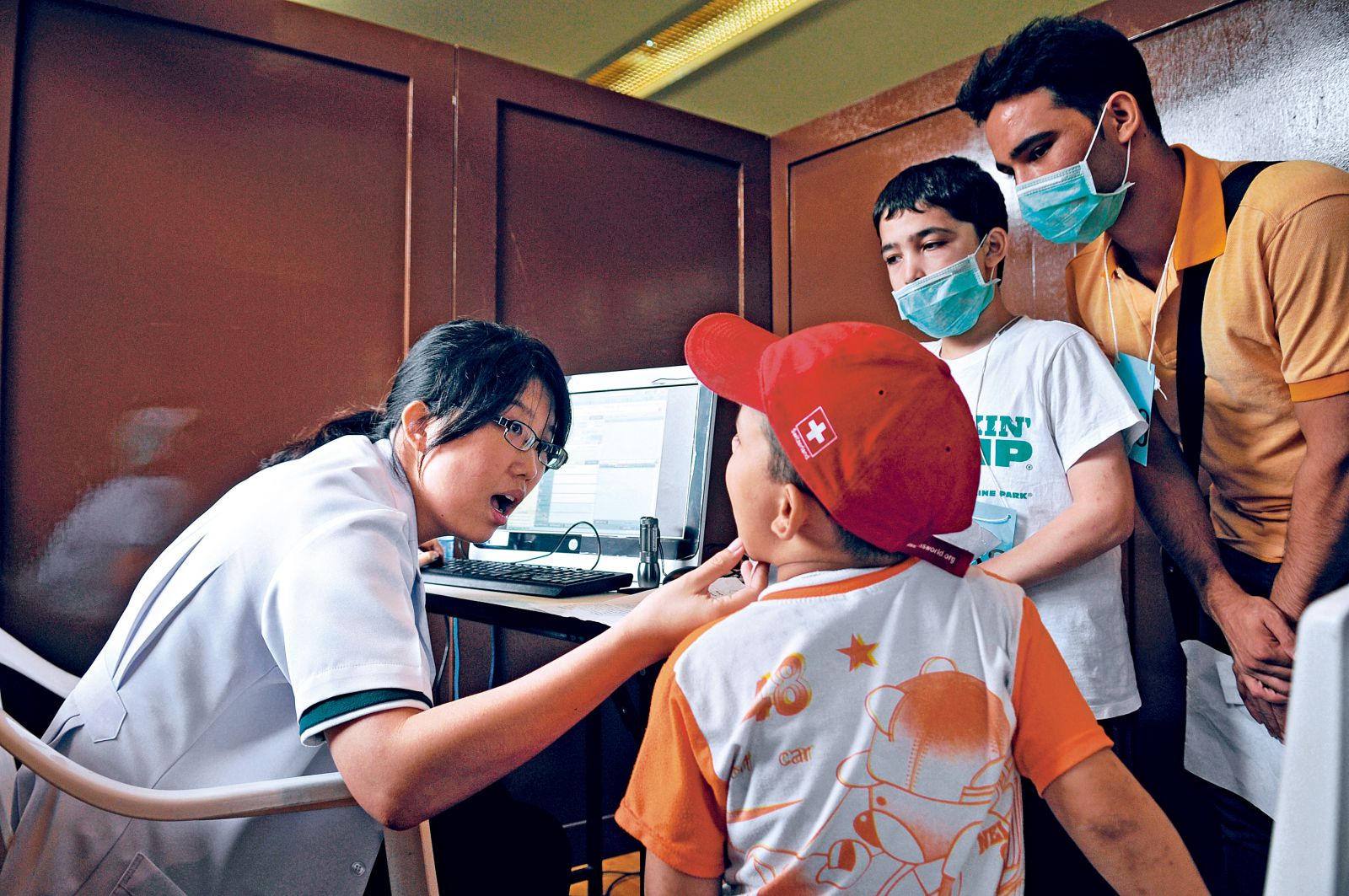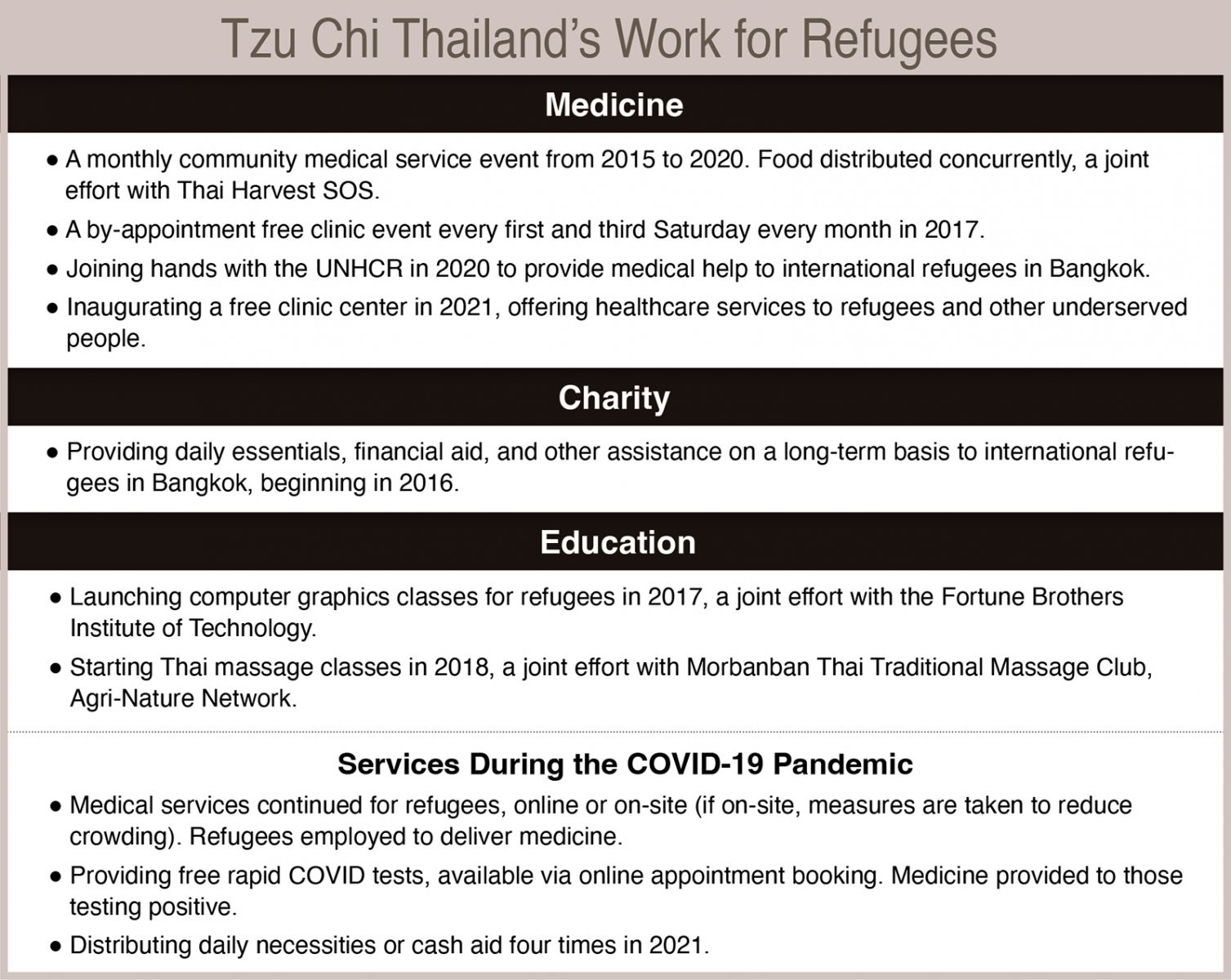Tzu Chi Care for Refugees in Thailand
By Budsara Sombut and Datchanee Suratep
Translated by Wu Hsiao-ting (吳曉婷)
Photos by Budsara Sombut
Tzu Chi Care for Refugees in Thailand
By Budsara Sombut and Datchanee Suratep
Translated by Wu Hsiao-ting (吳曉婷)
Photos by Budsara Sombut

The COVID-19 pandemic has made it harder for refugees to make ends meet. Tzu Chi Thailand reached out again in April this year to help. More than 1,500 families from over ten countries each received daily necessities, face masks, disinfectant alcohol, and 3,000 baht (US$88.4). Among the aid items were rice and flour, which refugees could choose from based on their eating preferences. Pinticha Jansuksri
One day, bullets and bombs fell like rain," said Omar Ahmed Abdillahi. "My two older brothers were injured, and one of them died. Dad decided to take my injured brother to another country to be treated. They never came back. We don't know if they are even still alive."
Omar, 31, is from Somalia, an African country plagued by war. Every conflict results in incalculable losses, especially to those living amidst the conflict. Sadly, even innocent people meet cruel ends. Omar lost his brother to war, and as a member of an ethnic minority, he became a target of an armed group too. Just surviving became difficult. Not knowing what else to do, he decided in 2015 to leave his home country with his wife, Hamda, their three daughters, and his wife's brother.
Most Somalis fleeing their country are first smuggled into Malaysia, and from there into Thailand. However, Omar didn't know he and his family were going to Thailand; he had misread "Thailand" as "Finland" and thought they were going to Europe. It wasn't until they arrived in Thailand that he realized their destination was the Southeast Asian country. Thailand didn't sign the 1951 United Nations Refugee Convention, and as a result, many refugees cannot obtain legal identifications there. Their only choice is to live in the country illegally.
Omar and his family were arrested by the police just 11 days after they arrived in Thailand on the grounds that they had been smuggled into the country and had no passports. (Their passports had been confiscated by their smugglers.) Fortunately, a Muslim helped bail them out. But without legal identities, they continued living in fear of being apprehended again. They avoided going out as much as possible and had to maintain constant vigilance when they had no choice but to go out. Their lives were made even harder because they weren't allowed to work. Life as an illegal refugee was surely no picnic.
Work relief
Omar and his family received a monthly subsidy from the Bangkok Refugee Center (BRC), but that money was only enough to pay their rent. As the breadwinner of his family, Omar had to try every way he could to make a living. He first worked as an interpreter at the BRC. Then, in 2017, he started serving as an interpreter at Tzu Chi's community medical service events. That's how Tzu Chi volunteers came to know him.
In 2014, Tzu Chi Thailand signed a memorandum of understanding with Tzu Chi USA and the U.S. State Department to provide free medical treatment to refugees in Thailand. Tzu Chi Thailand followed that agreement by offering community healthcare services to refugees in Bangkok, Thailand's capital, on the fourth Sunday of every month. Those ran from 2015 to 2020. Starting in 2018, a small free clinic event was added on the second Sunday of every month. This latter service lasted for eight months. Negotiations were made with the concerned authorities for a short period of amnesty for refugees coming to these events so that they would not run afoul with law enforcement.
Because refugees in Thailand come from over 40 countries, Tzu Chi organized a work relief program and employed refugees from different countries to serve as interpreters at the free clinic events. Volunteer Kuo Mei-Chun (郭玫君), who helped organize the interpreting service, recalled that Omar, with a family of six to support—including a newborn son—carried a particularly heavy burden. "That's why we often enlisted his service," said Kuo.
Omar's job as an interpreter brought in money for him and his family, thus easing his financial stress. However, another challenge arose not long after. He was arrested again in 2018 and detained at the Immigration Detention Centre. The burden of supporting his family thus fell to his wife.
Omar phoned Kuo the day before his detention telling her about what had happened to him and asking Tzu Chi volunteers to care for his family. Kuo was shocked by the news. She obtained Omar's address and asked volunteers who lived in Omar's district to go visit his family.
Volunteers Phongpot Patcharapakdeekumtorn (王敬閎), Suchon Saeheng (王忠炎), and Sunanta Sae-se (謝超) called on Omar's family the very next day. From that day onwards, no one could reach Omar on his phone anymore. To help his family get by, Tzu Chi started providing two bags of rice, powdered milk, and financial aid to the family every month. This assistance moved Hamda, Omar's wife, to no end. "The day Tzu Chi volunteers came to our home to offer help to us was the most beautiful day of my life," she said. "I can't overstate my happiness at the time. I felt as if I had been reborn."

Volunteers distribute aid to refugees and other underserved people in May 2020 at the Tzu Chi Jing Si Hall in Bangkok to help them weather the financial challenge posed by the coronavirus crisis. The man on the left was a refugee serving as an interpreter. Refugees were hired for the occasion to provide interpreting services.
Prospect of a new, better life
Omar was finally released from the detention center in October 2020, thanks to the help of a public service organization. He was never allowed to contact his family during those two years when he was locked up. When he returned home and learned how the aid from Tzu Chi had kept his family clothed and fed during his absence, he was as grateful as could be. "Tzu Chi will always be in our hearts," Omar said. "We'll never forget their kindness!"
After living in Thailand for seven years, Omar and his family passed the screening of the United Nations High Commissioner for Refugees (UNHCR) to be placed in a third country. They are moving to Canada. Volunteers visited the family to give them their best wishes when they learned of the good news. They also brought them some donated winter clothes. They hoped that no matter how far away they move or how cold the weather is in their adopted country, Tzu Chi's love will always be able to keep them warm at heart.
Volunteer Patcharapakdeekumtorn has been there for the family for nearly four years. He said that because of their status, refugees can't work in the country, even though they are fully capable of working. Such policies make it a struggle for them to get by. "I'm so happy for Omar and his family that they are moving to another country to start a new life," he said.
The family was originally scheduled to leave for Canada on March 24, but some of them were diagnosed with COVID-19 a few days before their departure, so their departure date was postponed to May 25.
Because of the pandemic and skyrocketing prices, Tzu Chi Thailand started their first wave of relief distributions for this year in January, planning to provide 6,600 needy families with daily necessities. While carrying out the work, volunteers didn't forget to deliver medicine, Jing Si herbal tea (a health drink developed in response to the coronavirus), multigrain powder, and other supplies to Omar and his family, who were being quarantined at home. They also arranged for a doctor to see the family online. Their symptoms improved afterwards, and their test results came back negative.
Omar and his family were on Tzu Chi Thailand's aid recipient list from 2018 to January this year. Though their case is now closed and the family is going away, volunteers believe that the good affinities they have formed with the family will be cherished and remembered by everyone involved.

A volunteer medical professional sees an Afghan refugee child at a Tzu Chi free clinic in Bangkok. Bangkok hosts many international refugees. Tzu Chi Thailand offered regular medical services from 2015 to 2020 to serve this group of people.

Contact Us | Plan a Visit | Donate
8 Lide Road, Beitou 11259, Taipei, Taiwan
886-2-2898-9999
005741@daaitv.com
©Tzu Chi Culture and Communication Foundation
All rights reserved.
